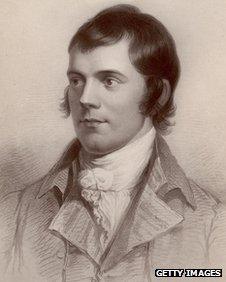Research findings on seven lost Robert Burns manuscripts
- Published

The original Burns manuscripts have been lost for up to 200 years
Research into long-lost Robert Burns manuscripts is to be presented for the first time at a conference in Glasgow.
The seven works, which include letters between the poet and his close friends, were found in 2010 inside a study of Burns' works dating from 1877-79.
Scots researcher Chris Rollie, who made the discovery, will present findings of his research later at Glasgow University's Burns Conference.
The manuscripts have since been sold to a private collector.
The seven original works were found inside an Extra Illustrated W Scott Douglas edition of The Works of Robert Burns, which belonged to Burns' publisher, William Paterson.
Clarinda letter
The finds include three holograph manuscripts written by Burns, three letters to the Bard, and one letter from Burns' 'Clarinda' to his friend and physician, Dr William Maxwell.
Some of the manuscripts appear to have been at one time in the possession of Dr Maxwell.
The physician was one of a small group of close friends who undertook the collection of the poet's own papers and related manuscripts following his death.
Mr Rollie said he felt privileged to have discovered the material.
"I realized very quickly that the material I was looking at was original and felt that some of it might be unpublished," he said.
"Careful research revealed that, whilst some of the material had been previously published, it was long lost and some material was indeed new to Burns scholarship.
"I feel very privileged to have discovered these manuscripts and look forward to sharing their contents at the conference."
Prof Gerry Carruthers, co-director of Glasgow University's Centre for Robert Burns Studies, said the manuscripts were of great importance to scholars of the poet.
"The finding of the Clarinda letter in full is very timely as we move towards a new edition of Burns's correspondence, and the other new manuscript findings of letters similarly help.
"The discovery of the draft, 'Composed on hearing a bird sing', will also help us understand better the creative process behind one of Burns's poems.
"The Aiken epistle and especially the Maxwell-McLehose exchange bring poignant and important additional detail to the immediate aftermath of Burns's death and its effect on those whom he had loved."
He added: "It is very exciting that such lost manuscript material continues to emerge in the 21st century."
- Published2 October 2012
- Published30 January 2012
- Published23 January 2012
- Published19 October 2011
- Published6 June 2011